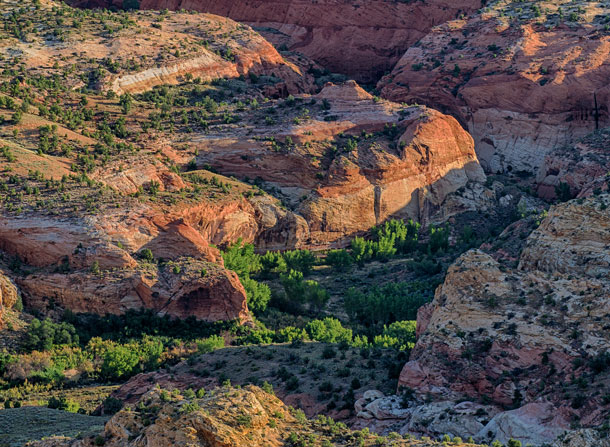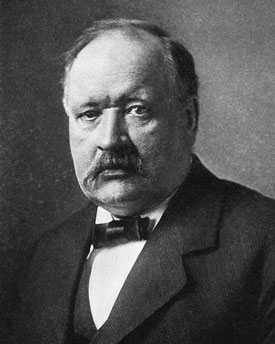Beyond The Headlines
Air Date: Week of February 8, 2019

Utah’s Grand Staircase-Escalante National Monument (Photo: Bureau of Land Management, Flickr, CC BY 2.0)
Peter Dykstra joins Host Steve Curwood this week to discuss how history is repeating itself on America’s public lands, as the pro-extraction Trump Administration mirrors actions taken by the Reagan Administration in the 1980s. Also, a recent study from the University of Southern California links traffic pollution to a junk food diet. Finally, a look back to celebrate the 160th birthday of scientist Svante Arrhenius, who published one of the first definitive papers on the greenhouse effect.
Transcript
CURWOOD: It's Living on Earth. I'm Steve Curwood. And with me now on the line from Atlanta, I think, is Peter Dykstra. He's an editor with Environmental Health News, that's EHN dot org and DailyClimate.org. Are you there, Peter?
DYKSTRA: You think, therefore I am. How you doing?
CURWOOD: Good. All right. Well, I want you to tell us about what's going on beyond the headlines. What do you got for us today?
DYKSTRA: Well, back in the 1980s, a very controversial Secretary of Interior for President Reagan, James Watt, became known for laying out oil and gas leases offshore and on land without checking with the oil industry to see if there was any interest in leasing them. And a lot of times, they're just wasn't. There's kind of a rerun of that going on now in public lands in Utah. The Grand Staircase-Escalante National Monument created by President Clinton under the Antiquities Act was reduced by President Trump, largely so that some coal interests and copper mining interests could get into areas that they had expressed mining interest in, in the past. Turned out there was no interest in the very low-grade coal that was available there. And now a copper mine that was proposed by a Canadian company has been dropped because the company's out of money.
CURWOOD: Yeah, that's right. Remember copper just makes pennies, there's not a lot of dough in it these days.
DYKSTRA: Not a lot of dough. You know, all of this is part of the legacy of Watt's spiritual successor, Ryan Zinke; he resigned in December in a cloud of controversy. And this week, President Trump announced he'll nominate David Bernhardt, who was Zinke's assistant; and unlike the replacement at EPA for the scandal-plagued Scott Pruitt -- Andrew Wheeler over at EPA was a former coal lobbyist -- but David Bernhardt, likely to be Interior Secretary, is actually a former oil lobbyist, so there's a big difference there. He had also worked to lobby for copper miners in the past.
CURWOOD: You know, you need diversity among your crew. What else do you have for us, Peter?
DYKSTRA: Ah, well there's a study from the University of Southern California, suggesting that there could be a link between early exposure to traffic pollution and a fondness later on for a junk food diet. This was published in the American Journal of Clinical Nutrition based on a previous study on animals that suggested that exposure to diesel exhaust made mice crave higher calorie diets. The new study follows human kids who consumed 34% more food high in trans fats if they had constant early exposure to air pollution.
CURWOOD: So was this related to income or race or anything like that?
DYKSTRA: No, the scientists that did the study said they were very careful to make sure it crossed economic lines, racial lines and looked at all income levels.
CURWOOD: So, it turns out that sitting in a car isn't what makes you fat, necessarily; breathing the air that goes by, huh?
DYKSTRA: Breathing the air -- and apparently there's a possible link between inhaling air pollution and later on inhaling Big Macs.

Svante Arrhenius authored one of the first definitive papers on the greenhouse effect. (Photo: Personal Head shot, Wikimedia Commons, Public Domain)
CURWOOD: And what do you have from the history vault for us today?
DYKSTRA: The 160th birthday of one of the leading lights of climate scientists, the chemist Svante Arrhenius, a Swede, born on February 18, 1859. He published one of the first definitive papers on what we now call the greenhouse effect. It turned out to be one of the biggest I-told-you-so's in the history of science, back in 1896 when he suggested that coal burning could impact temperatures in Europe.
CURWOOD: Well, he got that one right! So this Swede was a big deal scientist of his times, right?
DYKSTRA: That's right, Arrhenius was also involved in researching the Northern Lights, the aurora borealis, and he won the third ever Nobel Prize in Chemistry for his work on electrical conductivity. Happy 160, Svante Arrhenius!
CURWOOD: Thank you, Peter! Peter Dykstra's with Environmental Health News, that's EHN dot org, and DailyClimate dot org -- and we'll talk to you again real soon.
DYKSTRA: Okay Steve, thanks a lot. Talk to you soon.
CURWOOD: And there's more on these on our website LOE dot ORG.
Links
USC News | “Does air pollution make teens eat fattening foods?”
Lenntech | “History of the Greenhouse Effect and Global Warming”
Living on Earth wants to hear from you!
Living on Earth
62 Calef Highway, Suite 212
Lee, NH 03861
Telephone: 617-287-4121
E-mail: comments@loe.org
Newsletter [Click here]
Donate to Living on Earth!
Living on Earth is an independent media program and relies entirely on contributions from listeners and institutions supporting public service. Please donate now to preserve an independent environmental voice.
NewsletterLiving on Earth offers a weekly delivery of the show's rundown to your mailbox. Sign up for our newsletter today!
 Sailors For The Sea: Be the change you want to sea.
Sailors For The Sea: Be the change you want to sea.
 The Grantham Foundation for the Protection of the Environment: Committed to protecting and improving the health of the global environment.
The Grantham Foundation for the Protection of the Environment: Committed to protecting and improving the health of the global environment.
 Contribute to Living on Earth and receive, as our gift to you, an archival print of one of Mark Seth Lender's extraordinary wildlife photographs. Follow the link to see Mark's current collection of photographs.
Contribute to Living on Earth and receive, as our gift to you, an archival print of one of Mark Seth Lender's extraordinary wildlife photographs. Follow the link to see Mark's current collection of photographs.
 Buy a signed copy of Mark Seth Lender's book Smeagull the Seagull & support Living on Earth
Buy a signed copy of Mark Seth Lender's book Smeagull the Seagull & support Living on Earth

